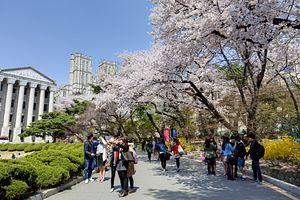The 2012 OECD Programme for International Student Assessment ranked South Korea fifth in reading and math. An unsurprising outcome given the country’s grueling education system and traditional veneration of scholars. Yet not all is well in South Korean academia: Recent years have seen a spate of scandals involving scientific misconduct, job fraud, and academic dishonesty.
Take for example Seoul National University’s former professor of biotechnology Hwang U-seok, whom Time listed among its 100 most influential people of 2004 after he published his success with human embryo cloning in the illustrious journal Science. A 2005 investigation determined Hwang’s research had been faked. Or Sin Jeong-ah, former professor of art at Dongguk University appointed in 2007 to co-direct the prestigious Gwangju Biennale. The Korea Times reports she claimed to have a PhD from Yale. She lost her job and the appointment when officials learned her academic background was a fabrication.
The New York Times offers similar cases such as architect Lee Chang-ha’s dismissal by Kimcheon Science College for holding a degree from a fictitious New Bridge University department, Kim Ok-rang’s resignation from Dankook University after admitting a diploma mill had “graduated” her, renowned Buddhist monk Jigwang’s claim he attended Seoul National University, and actress Yun Seok-hwa’s lie that she was an NYU alumna.
And then there is plagiarism. Recent cases include lawmaker-elect Yeom Dong-yeol and 2004 taekwondo gold medalist Moon Dae-sung, whose doctoral dissertations were works of plagiary.
Dry labbing, using fake diplomas, and plagiarism are discrete offenses, but they may all be taken as types of intellectual fraud. They occur everywhere, of course, but is there a particular susceptibility in Korea? The Korea Times records Ethics Professor Heo Nam-kyol’s view that “under the Confucian tradition, pupils were taught to copy the words of their teachers […] instead of writing their own opinions.” He contrasts this with the Western tradition of challenging authority, citing Aristotle as the progenitorial example. However, until the 18th century, imitation was encouraged in the West too. The Romantic era’s emphasis on artist as individual changed this. In Readings in Medieval Poetry, University of Virginia English Professor AC Spearing describes the post-Romantic poet as “burdened with the obligation of an impossible originality.”
Korea never had a Romantic movement or anything like it, nevertheless the practice of copying teachers’ work is only partly to blame. Confucianism also places a premium on social status, measured in Korean society by one’s age, profession, educational background, even clothing. This is not to say Harvard degrees or Prada suits have no effect outside Korea, but we must remember the Korean caste system lasted until the mid-1900s; faking accomplishments has been one way Koreans have enjoyed some modicum of social mobility. Part of the problem too is the excruciatingly competitive education system, whereby students suffer to make academic ends meet and unless they are gifted or can afford private tutors, there is little recourse.
This echoes the agoge, the Spartan education system whereby rules were so severe breaking them was inevitable. Legend tells of a boy who hid a stolen fox beneath his cloak while his commander questioned him, remaining silent even as the animal tore through his belly, such was his fear of failure. With this in mind, consider the number of South Korean teens who would also rather die than fail. Indeed, suicide remains the leading cause of death among Koreans aged 15 to 24.
But this issue is not merely a result of the depredations of intellectual vultures. Partly also it is a combination of inappropriate teaching methods and a maniacally strenuous system. The heirlooms of Confucianism, yes, but Confucianism is not the culprit. After all, intellectual fraud is not uniquely Korean. One need only raise the stakes and peer effects or simple greed will do the rest, Confucianism or no.
According to Dr. Janine Cook, IBT Laboratories once handled over a third of all toxicology testing in the U.S. until a 1983 FDA investigation invalidated 71 percent of its studies. And after former senior director of the Department of Homeland Security Laura Callahan resigned in 2004 over diploma fraud, further inquiries uncovered 463 similar cases in the federal government. Then we have the 2012 Harvard cheating scandal and 2013’s plagiarism headlines involving Jane Goodall, Shia LaBeouf and Rand Paul.
What is uniquely Korean then, is its culture of education. Shaming public figures if and when they happen to get caught is no solution and if Korean schools condone plagiarism by failing to adequately punish plagiarists, the risks will remain acceptable. Yet the remedy is in the root, the best defense being an educated youth and an edifying history from which to draw. Chronicling Spartan history, Plutarch writes when asked why Sparta was without walls, King Agesilaos II pointed to his men and answered, “these are Sparta’s walls.”
David Volodzko has provided cultural analyses for various publications including the Washington Monthly, openDemocracy, and 10 Magazine.

































